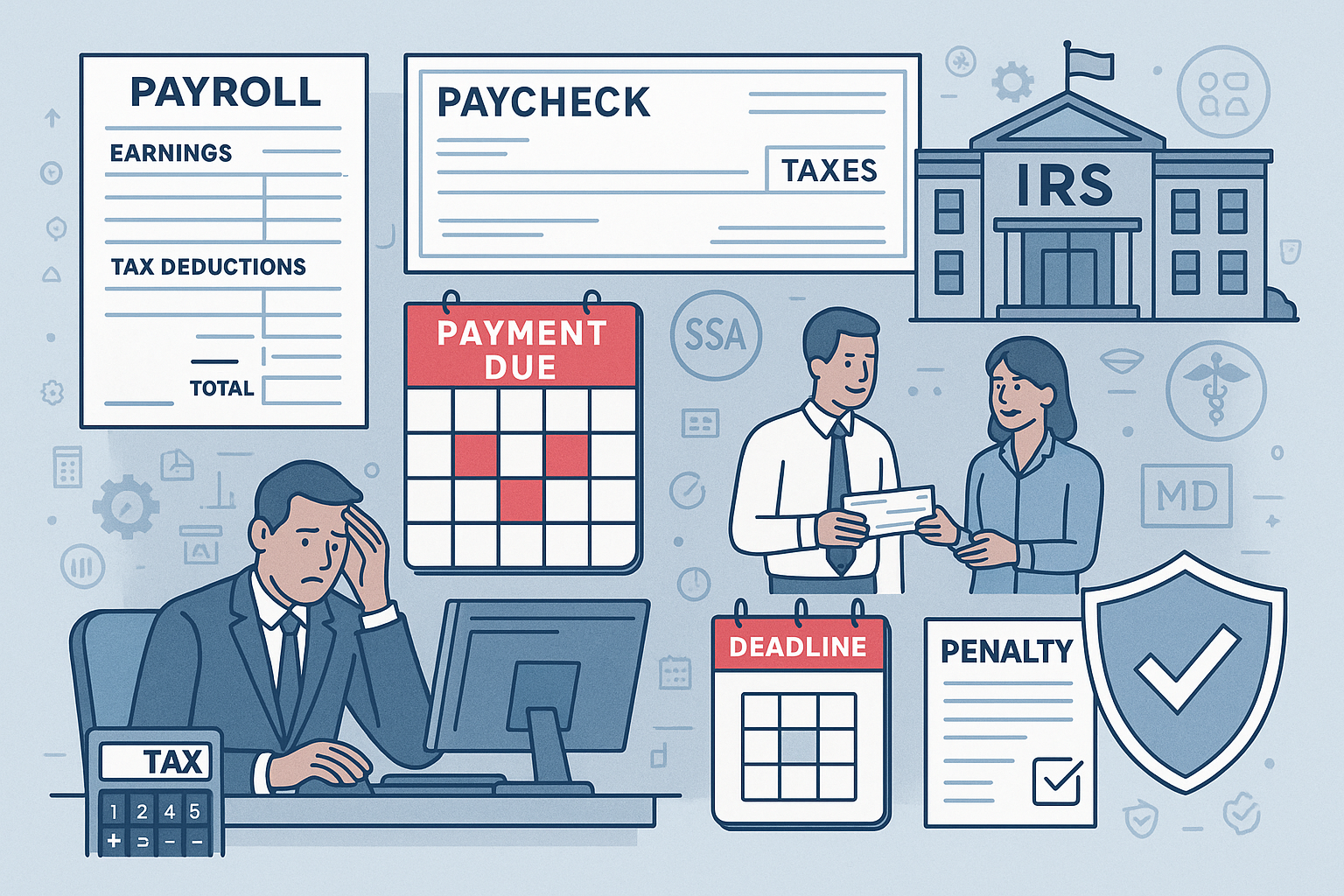



Payroll taxes are mandatory contributions employers withhold from employee wages to fund Social Security, Medicare, and unemployment programs. These taxes matter because they provide essential benefits that support workers during retirement, disability, or job loss. Employers must accurately calculate, withhold, and remit payroll taxes to avoid penalties and government scrutiny. Proper payroll tax management also builds employee trust, ensuring their contributions are credited correctly to government programs.
Compliance with payroll tax laws protects businesses from costly IRS penalties, interest charges, and potential criminal liability. Employees depend on accurate payroll tax withholding to secure benefits like Social Security credits and Medicare coverage. Noncompliance undermines worker confidence and can damage a company’s reputation among staff, customers, and regulators. Maintaining compliance demonstrates professionalism and responsibility, which fosters stronger business credibility and long-term stability in the marketplace.
Many businesses struggle with late payroll tax deposits, misclassified workers, and incorrect wage reporting to the IRS. Small errors can snowball into serious issues, leading to audits, liens, or enforced IRS levy actions. Employers often underestimate the complexity of multi-state compliance, especially with varying state and local tax rules. Professional guidance and automated payroll systems can minimize errors, ensure compliance, and reduce stress for employers and employees.
Payroll taxes are the taxes employers must withhold, report, and pay on behalf of their employees’ wages. These taxes fund federal programs such as Social Security, Medicare, and unemployment insurance. They differ from income tax because they are tied directly to compensation paid and employees’ paychecks. Understanding payroll compliance helps employers avoid unpaid payroll taxes, payroll tax penalties, and serious consequences like the trust fund recovery penalty.
Payroll taxes cover several obligations employers face when paying employees:
In short, payroll taxes represent a shared responsibility between employers and employees, and failure to pay the full amount or file on time can create significant tax liability.
Payroll taxes include multiple categories, each with its own rules:
These tax payments ensure that employees and employers contribute fairly to federal programs providing long-term security.
Payroll taxes and income taxes are not the same, even though both appear on employees’ paychecks:
This distinction is critical, as misclassifying employees or failing to withhold properly can result in unpaid payroll taxes and increase the business's tax debt.
Payroll taxes also include unemployment contributions, which are vital for supporting workers:
Employers pay federal and state unemployment taxes to help provide a safety net for workers while keeping their businesses in payroll compliance. Payroll taxes cover federal income tax withholding, Social Security taxes, Medicare taxes, and federal unemployment contributions. They differ from income tax because they fund specific programs tied to employee wages. Employers who fail to comply with payroll tax requirements may face penalties, tax debt, or IRS enforcement actions. Seeking tax advice from a qualified tax professional or using a payroll service helps ensure accurate reporting of employment taxes, timely deposits, and reduced risk of noncompliance.
Payroll taxes are one of the IRS's most closely monitored obligations, and mistakes can result in costly penalties and compliance problems. Below are businesses' most common payroll tax issues and why addressing them early is critical.
Managing payroll taxes accurately requires consistent attention and compliance. By addressing these common issues, businesses can avoid penalties, protect employee trust, and maintain a clean record with the IRS.
Failing to handle payroll taxes properly creates serious risks for businesses and their owners. The IRS treats unpaid payroll taxes as a priority, and the consequences escalate quickly.
Payroll tax problems are among the most serious issues a business can face, making swift action essential to prevent escalating penalties and long-term financial damage.
Businesses facing payroll tax problems can correct errors through amended filings to restore accuracy in IRS records. Amended returns demonstrate compliance and reduce the risk of escalated penalties or aggressive enforcement actions. Accurate filings also build credibility with the IRS when negotiating solutions for overdue balances. Correcting mistakes strengthens your position before setting up a payroll tax installment agreement.
When balances remain unpaid, businesses can establish an IRS installment agreement to manage cash flow and obligations. This agreement prevents immediate levy actions and provides structured repayment over time. Employers may also request penalty abatement to reduce additional charges. Professional representation ensures payroll tax disputes are managed strategically, improving outcomes with the IRS.
Payroll tax compliance is critical for avoiding IRS penalties, interest, and even potential enforcement actions. Staying ahead of deadlines requires proactive systems and reliable processes that ensure accuracy every pay period. Below are practical strategies to keep your payroll tax obligations on track.
By combining strong internal practices with professional tools or outsourcing, you can stay ahead of payroll tax due dates and minimize the risk of penalties or IRS enforcement.
Handling payroll tax issues can quickly overwhelm business owners, especially when dealing with the IRS. Professional guidance ensures that mistakes are minimized, penalties are avoided, and compliance is maintained.
By relying on payroll tax professionals, you can be confident that your business is compliant, protected, and well-prepared to address any IRS challenges.
The IRS can impose significant penalties and interest if payroll taxes are not paid on time. The “Trust Fund Recovery Penalty” may apply, which equals 100% of the unpaid taxes. Continued nonpayment may trigger federal tax liens, IRS levies, or seizure of business assets. Payroll tax issues are taken very seriously since these funds include employees’ withholdings, and failing to remit them is considered a violation of trust.
Yes, business owners, officers, and even certain employees with financial control can be held personally liable for unpaid payroll taxes through the Trust Fund Recovery Penalty. This means the IRS can pursue personal assets, including bank accounts, wages, and property, to collect the debt. Personal liability applies even if the business fails, making it critical for responsible individuals to ensure payroll taxes are filed and paid correctly and on time.
Payroll tax mistakes can often be corrected by filing amended tax returns, such as Form 941-X. Promptly correcting underpayments or misreported wages helps reduce additional penalties and interest. Penalties may apply if the IRS discovers mistakes before correction, but voluntary corrections usually show good faith. In complex cases, professional tax help may be necessary to negotiate penalties, resolve discrepancies, and ensure proper compliance moving forward.
Payroll taxes are taxes employers must withhold and pay based on employee wages, covering Social Security, Medicare, and unemployment insurance. Income taxes are taxes on earnings that employees owe, withheld by employers, and remitted to the IRS or state agencies. In short, payroll taxes fund specific federal programs, while income taxes support general government operations. Employers are legally obligated to withhold and remit both types on behalf of employees.
Yes, in some cases, payroll tax debt can be reduced or removed. The IRS may consider penalty abatement if you have reasonable cause, such as natural disasters or unexpected financial hardship. Businesses may also qualify for installment agreements, Offers in Compromise, or currently-not-collectible status. However, payroll tax debt is heavily enforced, especially trust fund portions, so resolution options are stricter. Acting quickly and exploring collection alternatives with professional help is crucial.
Methods of Contact
Vital for collaboration, support, or information exchange.